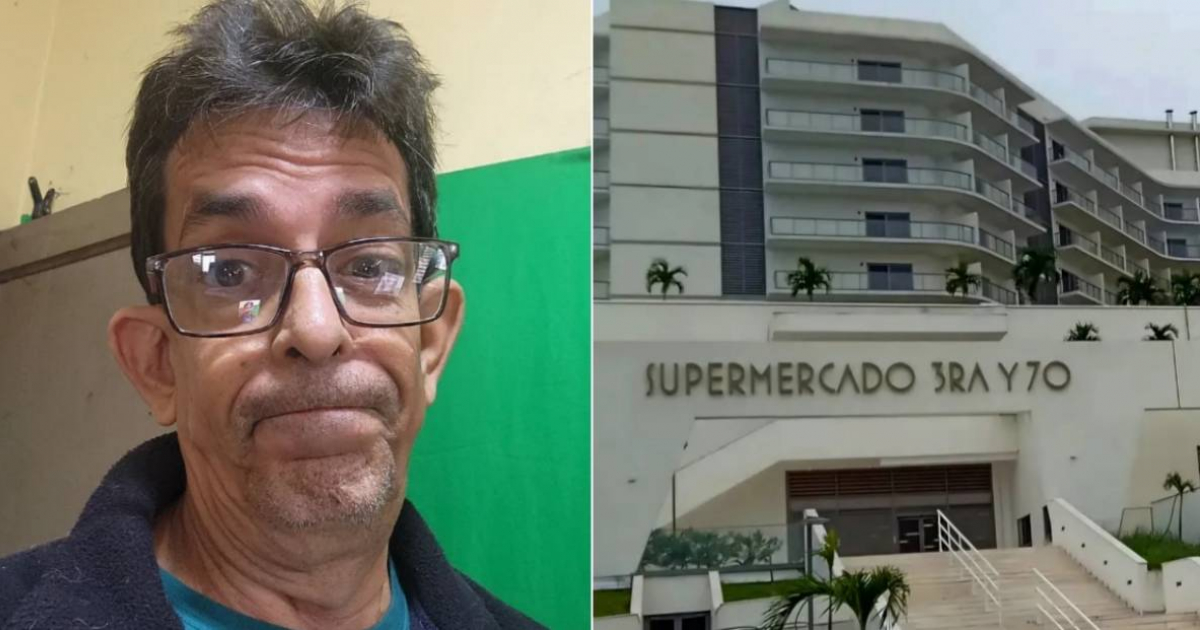
Related videos:
Cuban comedian Ulises Toirac sparked an interesting debate on social media after learning about the opening of the new supermarket at 3rd and 70, which accepts payments exclusively in dollars.
The supermarket is located in the Gran Muthu Habana Hotel building, owned by GAESA, and is situated directly across from the old 3rd and 70 Market, which currently sells its products in freely convertible currency (MLC), but is experiencing a shortage.
Toirac did not hold back in denouncing the growing inequality and dollarization of the Cuban economy, which he referred to as "a slap in the face."
The new Havana supermarket, which operates exclusively with cash dollars or cards linked to foreign currency accounts, is well stocked with both domestic and foreign products.
From processed meats, meats, juices, oils, and preserves to appliances, the supermarket offers a selection that stands in stark contrast to the extremely limited offerings in MLC stores.
"There is money for those who do and those who don't."
Toirac expressed his outrage at the economic exclusion that this supermarket represents for the majority of Cubans. "The famous blockade is relative. There is money for some and money for others," he wrote on Facebook, questioning the official justification for the supply crisis.
The humorist also made fun of the logic behind the dollarization in Cuba. "So, dear celestial patriarchs, the dollars that you magically convert into MLC with a flick of the wrist, aren't really dollars? Where do you hide those dollars?"
Additionally, he criticized the notion that the new supermarket in Havana is aimed at travelers. "Thinking that a tourist comes to Cuba to buy soap, rice, or toys is one of the most 'charming' things I could ever hear," he stated.
Unattainable prices for Cubans
A video posted by La Kinkalla TV shows shelves filled with products, an unusual sight for Cubans who frequent the MLC stores, where the shelves are usually empty.
The prices at the Supermarket on 3rd and 70 are unaffordable for most residents on the island. To give you an idea, a 500-gram panettone costs $15.20, a figure that far exceeds the average monthly salary in Cuban pesos.
Social inequality in Cuba
The dollar store reflects a model of economic exclusion. Only those with access to foreign currency can purchase products there, exacerbating social inequalities on the island.
Toirac emphasized this reality by stating that "the gap between the dispossessed and those in power continues to widen. These are not the dreams of those young people who died for an ideal."
Dollarization in Cuba: An Uncertain Future
Toirac warned that government policies will have inevitable consequences. "The families that send money via MLC will stop doing so. Say goodbye to that, as it doesn't solve anything for those living here. Those who can afford it will send cash in dollars. The flow of foreign currency will increase," he said.
The comedian concluded with a powerful reflection: "This is starting to resemble less and less the dreams of Martí or anyone else. Acting in their names with this reality is to deny them the purity and sacrifice for a better country."
With the emergence of exclusive dollar markets and the lack of access to basic products for most Cubans, criticisms like those of Toirac reflect the growing social discontent on the island.
Frequently Asked Questions about Dollarization and Inequality in Cuba
Why does Ulises Toirac criticize the opening of dollar supermarkets in Cuba?
Ulises Toirac criticizes the opening of supermarkets that accept dollars, arguing that it increases economic inequality in Cuba. These supermarkets, which are only accessible to those with foreign currency, leave the majority of Cubans without options, exacerbating economic exclusion on the island.
How does the dollarization of the Cuban economy affect the population?
The dollarization of the Cuban economy mainly affects the population by widening the social gap. Only those with access to dollars can shop in these new establishments, leaving the majority of Cubans, who earn their salaries in pesos, on the sidelines. This further deepens the economic and social crisis in the country.
What do citizens think about the prices in supermarkets that only accept dollars?
Citizens believe that prices in these supermarkets are unaffordable for most Cubans. Products like a 500-gram panettone, which costs 15.20 dollars, far exceed the average monthly salary in Cuban pesos, making these establishments inaccessible to the general population.
What is the impact of economic exclusion on Cuban society according to Ulises Toirac?
Ulises Toirac points out that economic exclusion increases social inequality in Cuba. This situation reflects an economic model where only a minority has access to goods and services, which contradicts the ideals of equality for which many fought on the island.
Filed under: